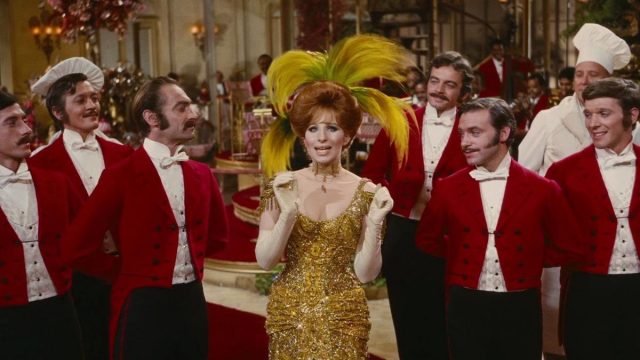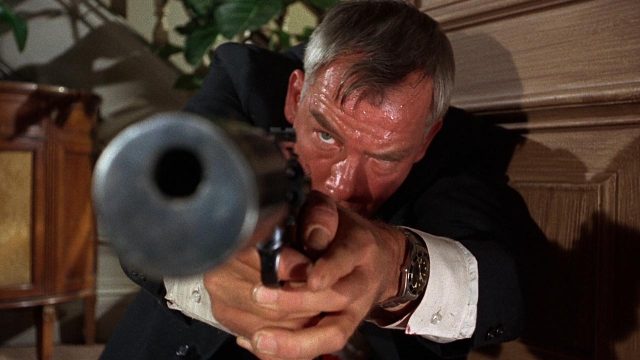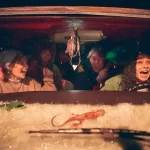TCM Classic Film Festival 2019: Part Three, by David Bax

Nine o’clock in the morning on the last day of TCM Fest at the Chinese Theater is a singularly weird way to see Gene Kelly’s Hello, Dolly! (1969) for the first time. The movie’s reputation has more to do with its massive budget and the rumored blow that Fox took on it at the box office (the size of which has probably been exaggerated) than with its quality. Star Barbra Streisand’s attitude toward the film in the intervening years hasn’t helped matters. So there were a lot of empty seats at the festival’s largest venue that day. On the other hand, the screening was introduced with a Q&A between Alicia Malone and Christopher Radko, author of Hello Again, Dolly! and pretty much the undisputed biggest Hello, Dolly! fan in the world. The seats that were filled largely contained other mega-fans and the atmosphere in the room seemed to be actively attempting to defy the movie’s legacy. I don’t know what effect that had on me, a first timer, but I can tell you confidently that this movie is fucking awesome. It’s nearly two and a half hours of non-stop catchy, rousing, jubilantly choreographed musical numbers performed by incredibly talented singers and dancers as well as massive amounts of extras wearing staggeringly beautiful costumes. It also has, without a doubt, the best list of characters names I’ve ever encountered. Horace Vandergelder, Cornelius Hackl, Barnaby Tucker, Ermengarde Vandergelder, Ambrose Kemper, Rudolph Reisenweber; there’s even a character named Gussie Granger who pretends to be a character named Ernestina Simple. Seriously, I don’t know what people were thinking at the time but it seems just about impossible not to have a blast watching this movie.
Does it include a nightclub/lounge singer? In the midst of the title song, Streisand duets with the band leader, played by Louis Armstrong, at a fancy restaurant/dancehall. I’ll allow it.

If there’s anything at TCM Fest that gets a crowd more excited than pre-Code movies, it’s appearances by big stars. So there was quite a turnout for Don Siegel’s The Killers (1964), an early neo-noir film whose femme fatale is played by Angie Dickinson. Dickinson herself showed up to answer questions before the screening and, while TCM host Ben Mankiewicz tried to steer the conversation toward the film of the day, Dickinson was delightfully untethered. She spent a decent amount of time praising Clint Eastwood’s recent The Mule. But she eventually got to some stories about The Killers, most of which were about Ronald Reagan, who plays one of the movie’s many villains, and how he was a nice guy despite her disagreeing with his politics. The film itself was shown on a brilliant, sharp-looking DCP (as was Hello, Dolly!; they also happen to be the only two color movies I saw at the festival) that highlighted Siegel’s stylized garishness. This is another movie with a somewhat shaky reputation but Siegel brings a sense of un-Hollywood danger to the thing. Along with Clu Gulager’s disturbingly appealing performance as a cool sociopath, it’s the kind of movie that feels thrillingly like it could go off the rails at any moment. Also worth noting: Seymour Cassel, who had passed away only days earlier, makes a brief appearance as a post office clerk.
Does it include a nightclub/lounge singer? It’s really just background music to a scene of Reagan, Dickinson and John Cassavetes planning a robbery at a cool bar but technically yes.

Sadly, every TCM Fest has to have a final film for each attendee. The crop I took in this time around was probably my strongest ever and yet I still went out on a high note with Clarence Brown’s A Woman of Affairs (1928), the only silent movie I saw this year. With Brown directing and Greta Garbo and John Gilbert on the screen, this movie reunites the team responsible for the masterful Flesh and the Devil, made two years prior. The similarities go further. Both are movies about childhood sweethearts kept apart by circumstance in adulthood and both are about as passionate and sexy as movies about honor and decency can be. A Woman of Affairs is also full of technical bravura. An early stunt in which a car drives at top speed over a ditch, straddling the center in which workers duck just under the vehicle, looks frankly, irresponsibly dangerous but very cool. Later, we get a reverse version of the famous, long push-in shot from Sunrise, which would have come out a year earlier. But the movie’s influence is as strong as its influences; a shot in which Garbo methodically flips a lamp on and off had to have been seen by Adrian Lyne before he made Fatal Attraction. If I have any complaint–and I don’t really, not about this film or about TCM Fest–it’s that the live orchestra that accompanied the screening was so good as to occasionally be distracting.
Does it include a nightclub/lounge singer? No, silly, it’s a silent movie.





























